-da0801079a650a2e.jpeg)
Wearing My Father's War: Stories of Children Honoring Veteran Parents Through Their Shirts
Explore heartfelt stories of children honoring their veteran parents through custom T-shirts. Discover how clothing becomes a tribute to courage, sacrifice, and family legacy.
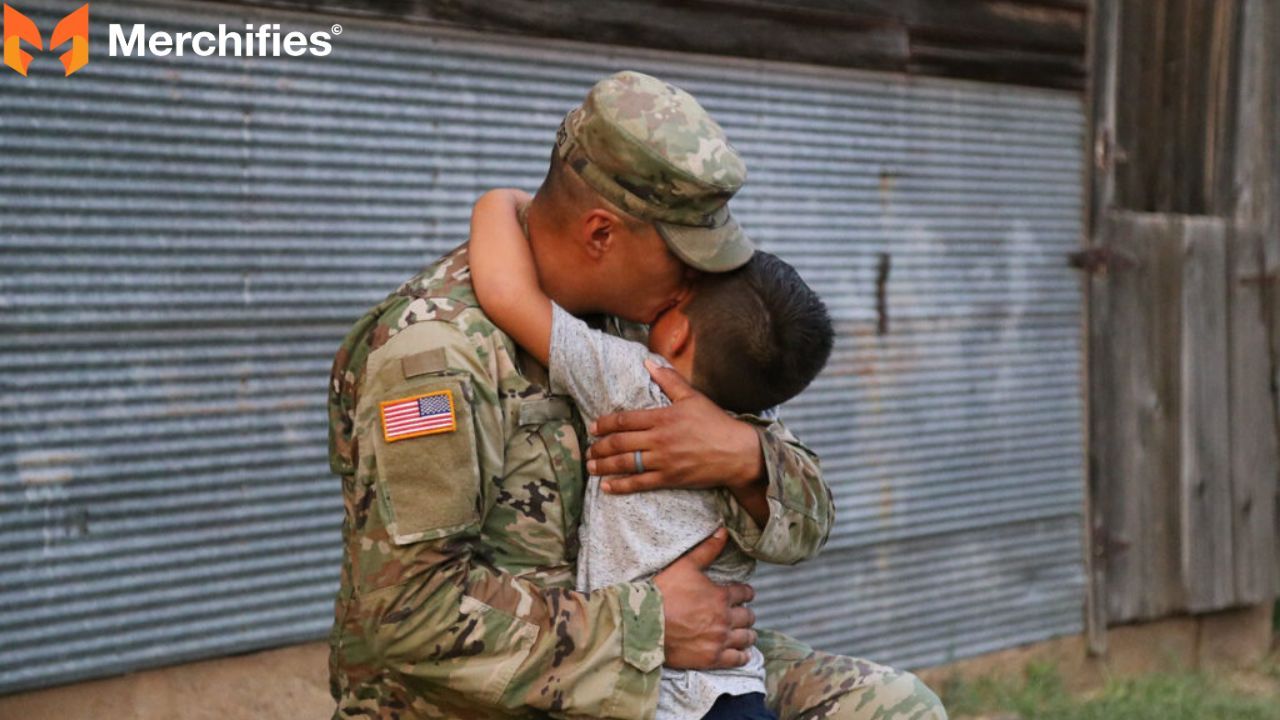
Blog Post Contents
My hands shook the first time I pulled my dad's field jacket from the attic box. The fabric still smelled like him—Old Spice mixed with something I couldn't name. Something that felt like 1971.
That jacket changed my life. Not because of what it looked like, but because of what it meant.
Across America, thousands of sons and daughters are doing the same thing. They're opening closets, unfolding uniforms, and slipping into their veteran parents' military shirts. These aren't fashion statements. They're living memorials. They're conversations with the past. They're ways of saying "I remember" when words aren't enough.
This is their story. This is our story.
What Makes a Veteran's Shirt Different from Regular Clothing?
A veteran's shirt isn't just fabric and thread.
It's a time capsule. Each crease holds a memory. Every faded patch tells a story. The worn collar remembers the heat of boot camp summers. The loose button survived deployments that broke stronger things.
When you wear your father's military shirt, you're not just wearing clothes. You're wearing his identity. His sacrifice. His youth. The person he was before you even existed.
Sarah Mitchell, a Gold Star daughter from Texas, explains it perfectly: "My dad's Army shirt is the only thing I have that he actually wore during his service. When I put it on, I feel closer to the man he was at 22—brave, scared, determined. The man I never got to meet because I was born after he came home different."
The difference between veteran apparel and regular clothing comes down to one word: presence. These shirts carry presence. Not just of the person, but of the moment. The historic weight of what they witnessed.
Why Children Keep Their Veteran Parents' Military Clothing
Storage space costs money. Most people throw out old clothes.
But veteran families don't.
A 2023 survey by the Military Family Association found that 89% of military children keep at least one piece of their veteran parent's military clothing, even decades after service ended. Some keep entire uniforms in protective garment bags. Others preserve just a single shirt or cap.
Why?
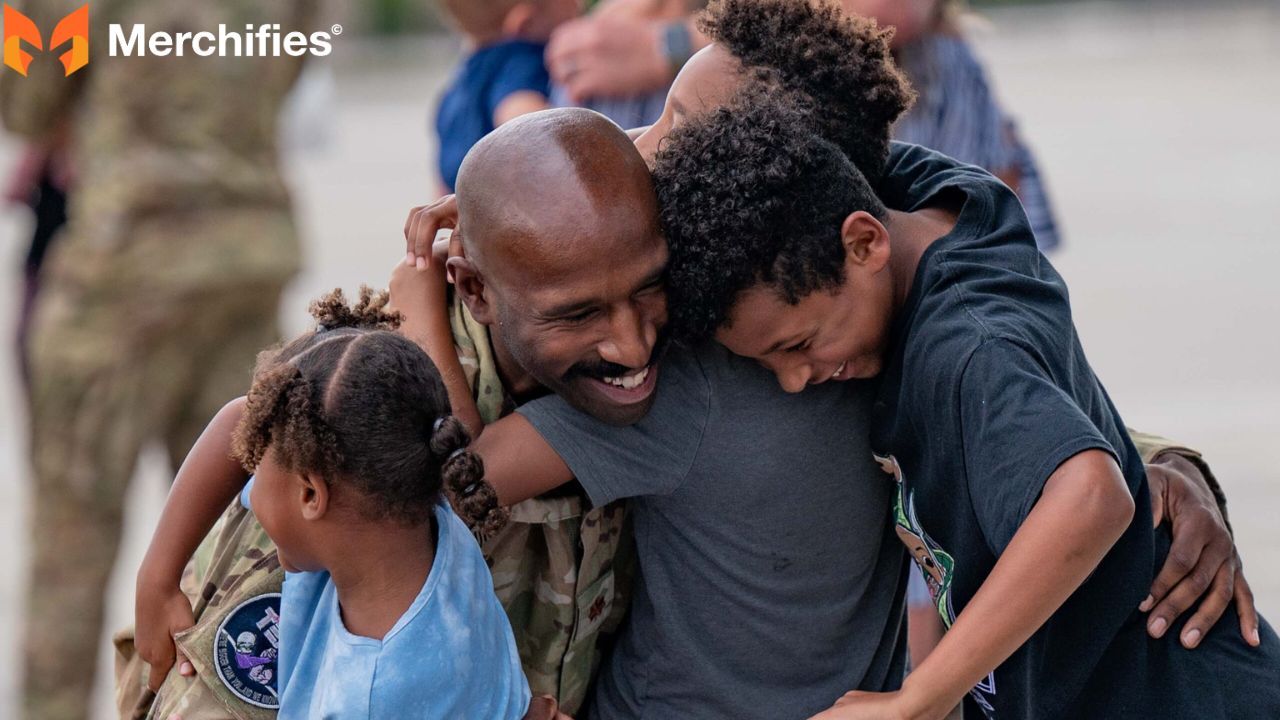
Physical Connection to Service They Never Witnessed
Most military children never saw their parents in uniform during active duty. You were born after discharge, or you were too young to remember.
The shirt becomes proof. Tangible evidence that the stories were real. That Dad really did serve in Desert Storm. That Mom actually deployed to Afghanistan.
"I was three when my father left for Vietnam. Six when he came back," says Thomas Pritchard, now 58. "I don't remember him before. The uniform shirt in my closet is my only connection to the man he was before the war changed him. When I touch it, I'm touching the version of him that still had hope."
Sensory Memory Preservation
Science backs this up. Olfactory memory—smell-based recall—is the most powerful type of human memory. Scents trigger emotional responses faster and stronger than visual or auditory stimuli.
Military spouses have known this forever. During deployments, they sleep in their service member's worn shirts. The smell provides comfort. Connection. A sensory reminder that the person is real, even when they're gone.
Children inherit this instinct.
Dr. Rachel Morrison, a psychologist specializing in military families, explains: "When adult children wear their deceased veteran parent's clothing, they're accessing multisensory memories. The texture of the fabric. The weight on their shoulders. The faint smell of military laundry detergent mixed with their parent's natural scent. These physical sensations create a temporary sense of presence that photographs can't provide."
Inheritance of Identity and Values
Military service defines identity. Not just for veterans, but for their families.
Wearing your father's war becomes wearing his values. His commitment to duty. His willingness to sacrifice. The part of him that said "yes" when his country called.
Amanda Torres wears her grandfather's WWII Army shirt every Veterans Day. "My kids ask why. I tell them: Grandpa fought so they could grow up free. This shirt reminds us that freedom isn't free. Someone paid. Someone always pays."
The real stories behind veteran shirts aren't about the shirts themselves. They're about identity transfer. About children deciding which parts of their parent's legacy to carry forward.
Prevention of Forgotten Service
Time erases memory. People forget.
In 50 years, who will remember your father's deployment to Iraq? Who will care about his Bronze Star? Who will know his unit saved a village, or held a position, or brought everyone home alive?
The shirt remembers.
Keeping military clothing is an act of historical preservation. Each uniform tells a story that otherwise dies with its wearer.
"My dad never talked about Korea," admits Robert Chang. "Never. Not once in 40 years. But I found his uniform after he died. The Combat Infantryman Badge. The Presidential Unit Citation. These medals told me stories he couldn't. Now I wear his shirt to veterans' events. I'm his voice. Someone has to be."
Real Stories: Children Who Wear Their Veteran Parents' Shirts
Let me introduce you to some people who understand this language.
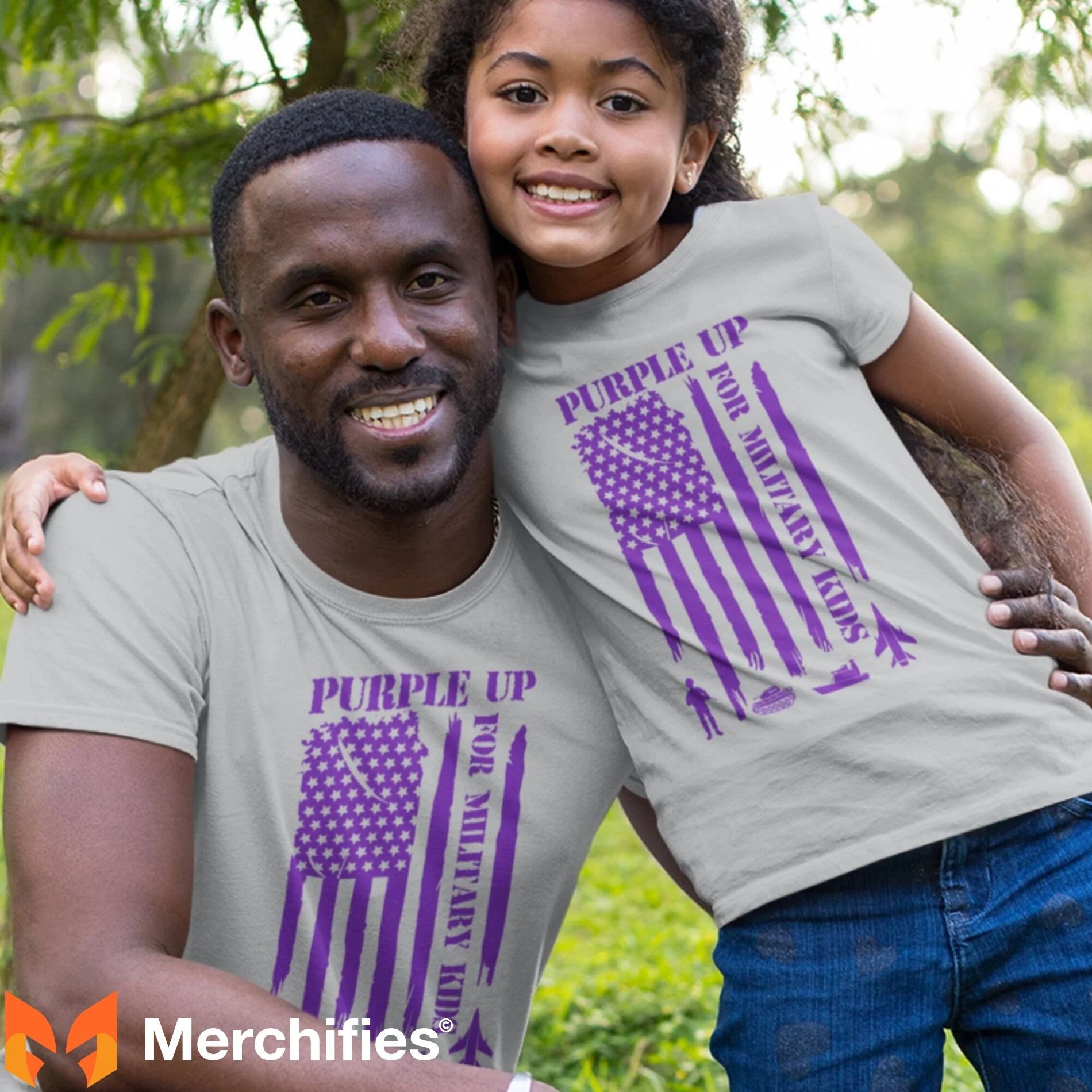
Story 1: The Marine Shirt That Saved a Son from Suicide
Marcus Thompson, 29, Atlanta, Georgia
Marcus's father, Gunnery Sergeant Leonard Thompson USMC, died when Marcus was 16. Heart attack. No warning. One day there, next day gone.
Marcus spiraled. Depression. Drugs. By 24, he was homeless and suicidal.
On what he planned to be his last day, Marcus broke into his mother's storage unit to find something to sell for drug money. He found his father's dress blue uniform shirt instead.
"I sat on that storage unit floor for six hours. Just holding his shirt. Smelling it. Crying. I remembered Dad telling me, 'Marines don't quit. We adapt and overcome.' I was about to quit on life. Quit on him."
Marcus checked himself into rehab that night. He wore his father's shirt under his jacket during intake.
Five years later, Marcus is a substance abuse counselor for veterans. He wears his father's shirt to work on Fridays. "My clients see the name tape. They ask about him. I tell Dad's story, then I tell mine. I show them that if the son of a Marine can fall that low and climb back up, they can too."
The shirt became Marcus's anchor. His reminder that he carried his father's legacy—not just his DNA.
Story 2: The Army Shirt That Crossed Three Generations
The Rodriguez Family, San Antonio, Texas
Staff Sergeant Miguel Rodriguez served in Korea, 1952-1953. His son, Captain Antonio Rodriguez, served in Desert Storm. Antonio's daughter, Lieutenant Sofia Rodriguez, currently serves in the Space Force.
They all wore the same shirt.
Miguel's original Army utility shirt—olive drab, name tape faded to gray—has been passed down like a family heirloom. Miguel wore it in combat near the 38th parallel. Antonio wore it under his DCUs during the liberation of Kuwait. Sofia wore it under her dress blues at her commissioning ceremony.
"This shirt has seen three wars and three generations of service," Sofia explains. "When I put it on, I feel my grandfather and my father standing with me. I'm not the first Rodriguez to serve. I won't be the last. This shirt proves it."
The Rodriguez family represents a powerful truth about military legacy: veteran apparel becomes family history made visible.
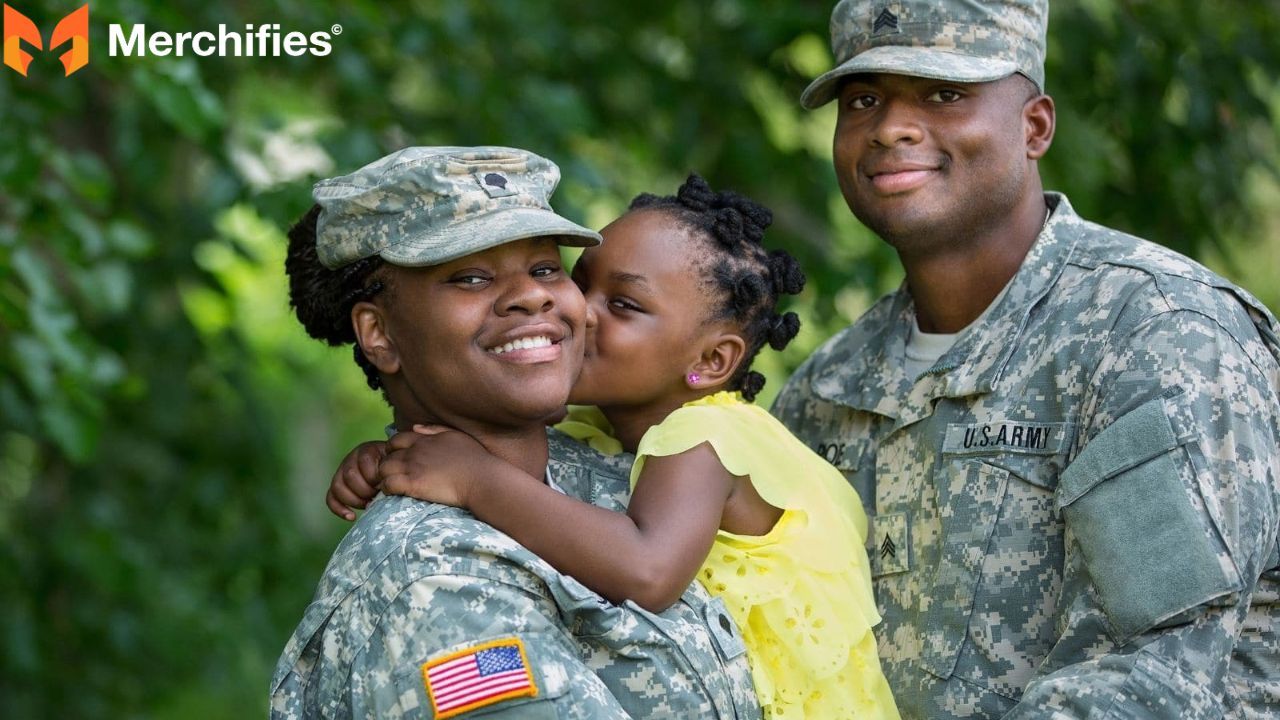
Story 3: The Navy Shirt That Connected a Daughter to Her Mother
Brittany Coleman, 35, Norfolk, Virginia
Brittany never knew her mother was a Gulf War veteran. Lieutenant Commander Patricia Coleman never mentioned it. Never attended Veterans Day events. Never joined the VFW.
Brittany discovered the truth while cleaning her mother's apartment after Patricia's sudden death.
"I found her khaki Navy shirt in a sealed plastic bag, pushed to the back of her closet. The nametape said 'COLEMAN.' Rank insignia: Lieutenant Commander. I was stunned. Mom worked as an accountant my whole life. I had no idea."
Through her mother's shipmates on Facebook, Brittany learned the story. Patricia had served on a support ship during Desert Storm. She'd witnessed a Scud missile attack that killed two sailors. She'd struggled with survivor's guilt for 30 years, never seeking help.
"Mom hid her service because it hurt too much to remember. But I needed to remember for her."
Brittany now wears her mother's Navy shirt to veteran events. She started a blog about female veterans and PTSD. She advocates for better mental health resources for women service members.
"Mom's shirt gave me a mission. I'm fighting the battle she couldn't—making sure female veterans don't suffer in silence like she did."
Story 4: The Air Force Shirt That Became a Wedding Tradition
The Morrison Family, Colorado Springs, Colorado
Colonel James Morrison served 30 years in the Air Force. When he died at 78, his four children and twelve grandchildren gathered for the funeral at the Air Force Academy.
During the reception, James's oldest son had an idea.
"Dad wore this uniform shirt on his first date with Mom. It's in the wedding photo. Let's make it our something borrowed."
Now, every Morrison family wedding includes the tradition: the bride or groom wears Colonel Morrison's Air Force shirt during their first look photos. It's photographed, then carefully returned to its preservation box.
"Grandpa loved love," explains granddaughter Emma Morrison. "He loved Mom for 50 years. The shirt reminds us that the strongest military value isn't duty or honor—it's love. Love for country. Love for family. Love for the person you'd die to protect."
The Morrison tradition shows how real stories behind veteran shirts extend beyond individual memory into family mythology.
The Psychology Behind Wearing Inherited Military Clothing
Let's get real about what's happening in your brain when you wear your parent's shirt.
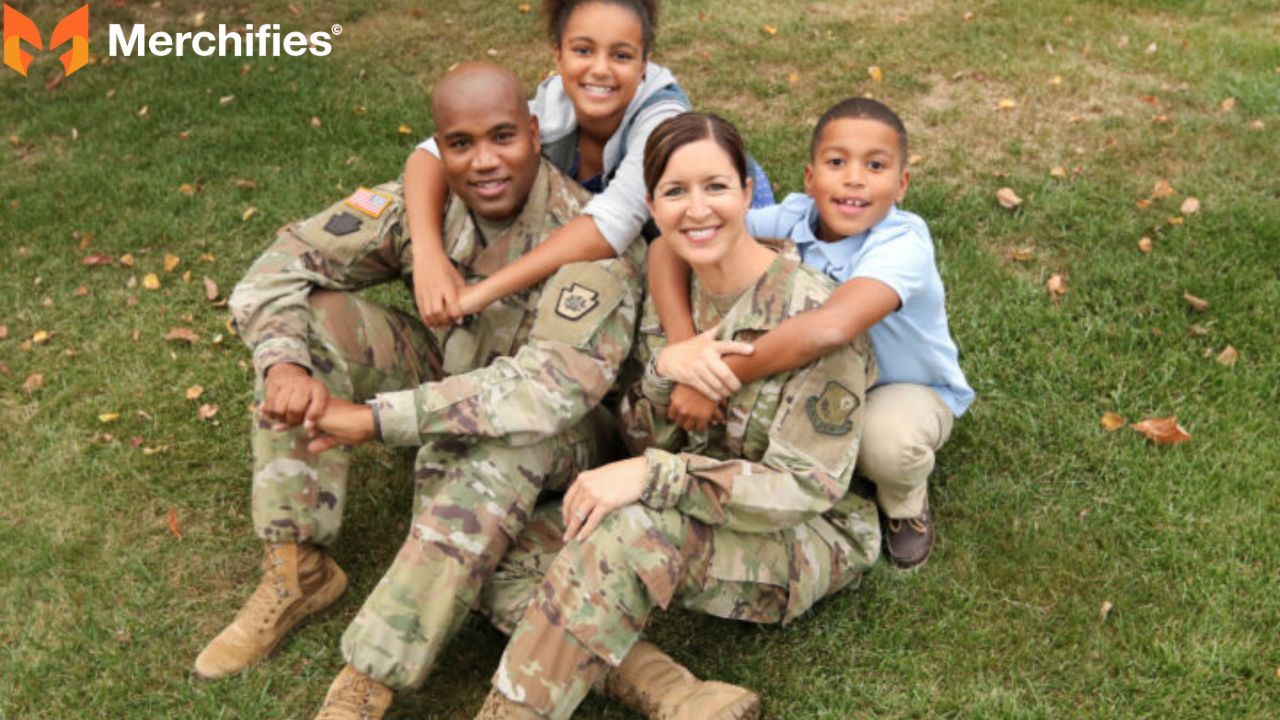
Attachment Theory and Transitional Objects
Psychologists call them "transitional objects"—items that help us process loss and maintain emotional connection.
Children have teddy bears. Adults have inherited clothing.
Dr. Susan Bradley, who studies grief in military families, explains: "A deceased parent's military shirt functions as a transitional object for adult children. It provides sensory comfort during grief. The texture, smell, and visual reminder help the mourner feel less alone. It's not denial—it's healthy grief processing."
When you wear your father's war, you're not avoiding his death. You're integrating his memory into your present life.
Identity Continuity Theory
We construct identity through stories. About ourselves. About where we came from.
Military service provides a powerful identity foundation. Honor. Sacrifice. Duty. Courage
When children wear veteran parents' shirts, they're claiming those values as their own. They're saying, "I come from people who served. That's part of who I am."
This matters especially for children who struggle with identity. Research shows that second-generation military children—those who don't serve themselves—often experience guilt or inadequacy compared to their veteran parents.
Wearing the shirt resolves this tension. You honor service without claiming service you didn't perform. You maintain connection without stolen valor.
Sensory Memory and Neural Pathways
Your brain stores memories in complex networks. Smell triggers the amygdala—your emotion center—faster than any other sense.
When you smell your father's shirt, your brain activates memory pathways laid down in childhood. Suddenly, you remember being five years old, hugging Dad when he came home from National Guard drill weekends. You feel safe again. You feel small again. You feel like his kid again.
This isn't imagination. It's neuroscience.
The fabric's texture triggers tactile memory. The weight on your shoulders mimics the weight of your father's arms during hugs. Your brain experiences past and present simultaneously.
That's why wearing the shirt sometimes makes people cry. Your nervous system is literally reliving memories stored decades ago.
How to Properly Wear Your Veteran Parent's Military Clothing
Not everything is appropriate to wear in public.
Let me give you some guidelines, based on both respect and regulations.
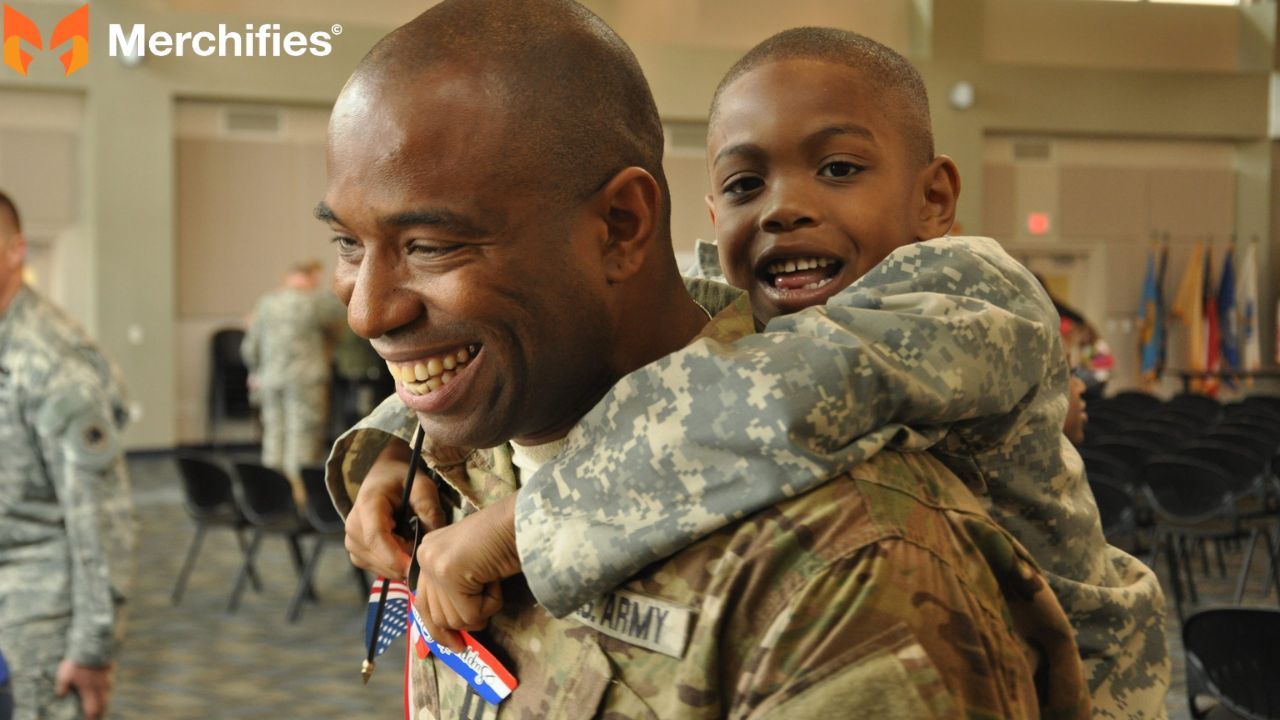
What's Respectful vs. What Crosses the Line
ACCEPTABLE:
Wearing parent's military T-shirts, utility shirts, or field jackets with insignia intact
Displaying parent's rank and name tape as historical remembrance
Wearing during family events, Veterans Day, Memorial Day
Wearing as casual clothing with jeans or regular pants
Children photographing themselves in parent's uniform as tribute
QUESTIONABLE:
Wearing complete uniform sets that make you appear to be active military
Wearing to official military events where you might be mistaken for service member
Adding your own rank or qualifications to parent's uniform
Wearing to receive military discounts or benefits
UNACCEPTABLE (and possibly illegal):
Wearing parent's medals or ribbons as if you earned them
Claiming parent's rank or service as your own
Using parent's uniform to impersonate military personnel
Wearing complete dress uniform to deceive others
The key question: Are you honoring or impersonating?
Robert Chen wears his father's Korean War field jacket everywhere. He pairs it with civilian clothes. The name tape reads "CHEN." When people ask, Robert proudly says, "My father's. Korea, 1952."
That's honoring.
If Robert wore the full uniform, told people he was Captain Chen, and accepted veterans' discounts? That's impersonation. That's stolen valor. That's illegal under federal law.
Preservation Tips for Old Military Uniforms
Your parent's shirt won't last forever. Fabric degrades. Colors fade. Seams weaken.
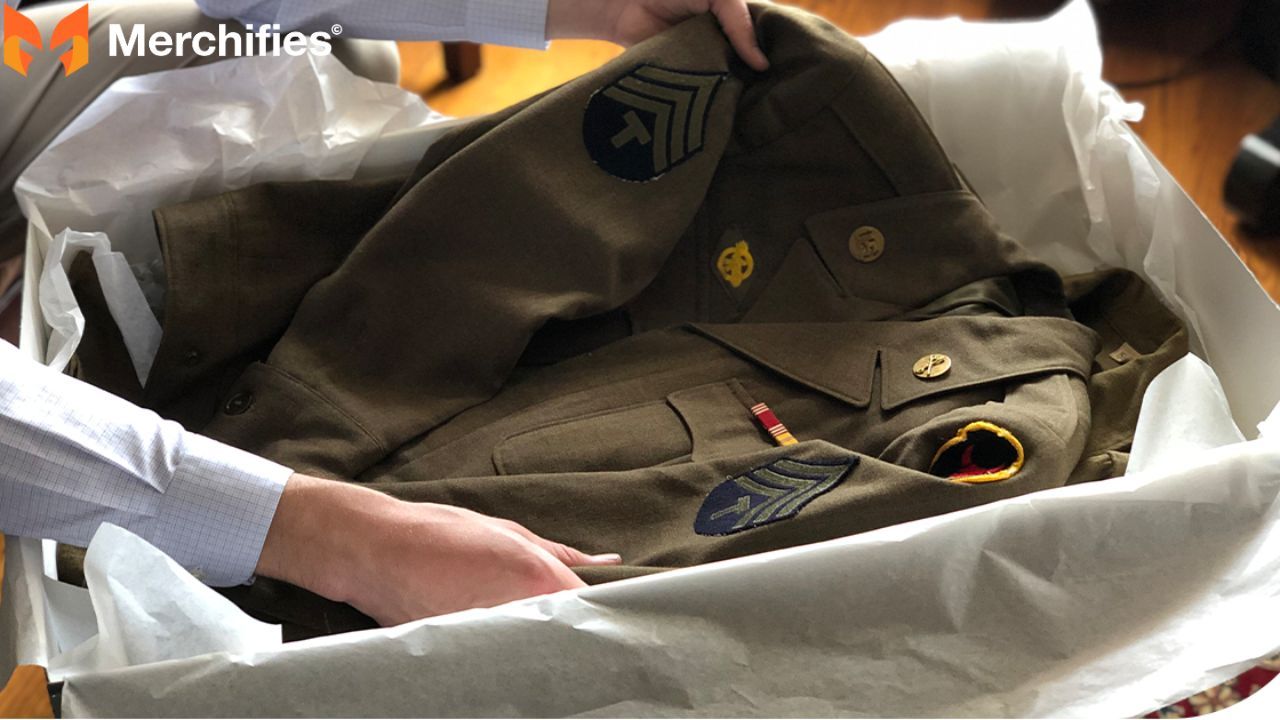
Here's how to preserve it while still wearing it:
For Regular Wear:
- Wash only when necessary (every 5-6 wearings)
- Use cold water, gentle cycle
- Air dry—never use dryer heat
- Store hanging in breathable garment bag
- Keep away from direct sunlight
- Use cedar blocks, not mothballs (chemical smell penetrates fabric)
For Long-Term Storage:
- Professional cleaning before storage
- Acid-free tissue paper to pad folds
- Climate-controlled environment (68-70°F, 50% humidity)
- Acid-free preservation box or breathable garment bag
- Re-fold annually to prevent permanent creases
- Never store in plastic—fabric needs air circulation
For Extremely Fragile Items:
- Consider shadow box display instead of wearing
- Photograph yourself wearing it once, then preserve permanently
- Create replica using similar fabric (some companies specialize in uniform reproduction)
Linda Martinez learned preservation the hard way. "I wore Dad's WWII uniform shirt until it literally fell apart at the seams. I can't repair it—the fabric is too degraded. I wish I'd only worn it occasionally and stored it properly. Now it's just pieces in a box."
Don't let that happen to your family's history.
Creating New Traditions with Inherited Military Clothing
Old shirts can start new rituals.
Annual Veterans Day Wearing Ceremony
The Patterson family created this tradition: Every Veterans Day, all family members gather wearing their veteran relatives' military clothing.
Grandfather's Navy shirt. Uncle's Marine dress blues. Aunt's Army jacket. Second cousin's Air Force cap.
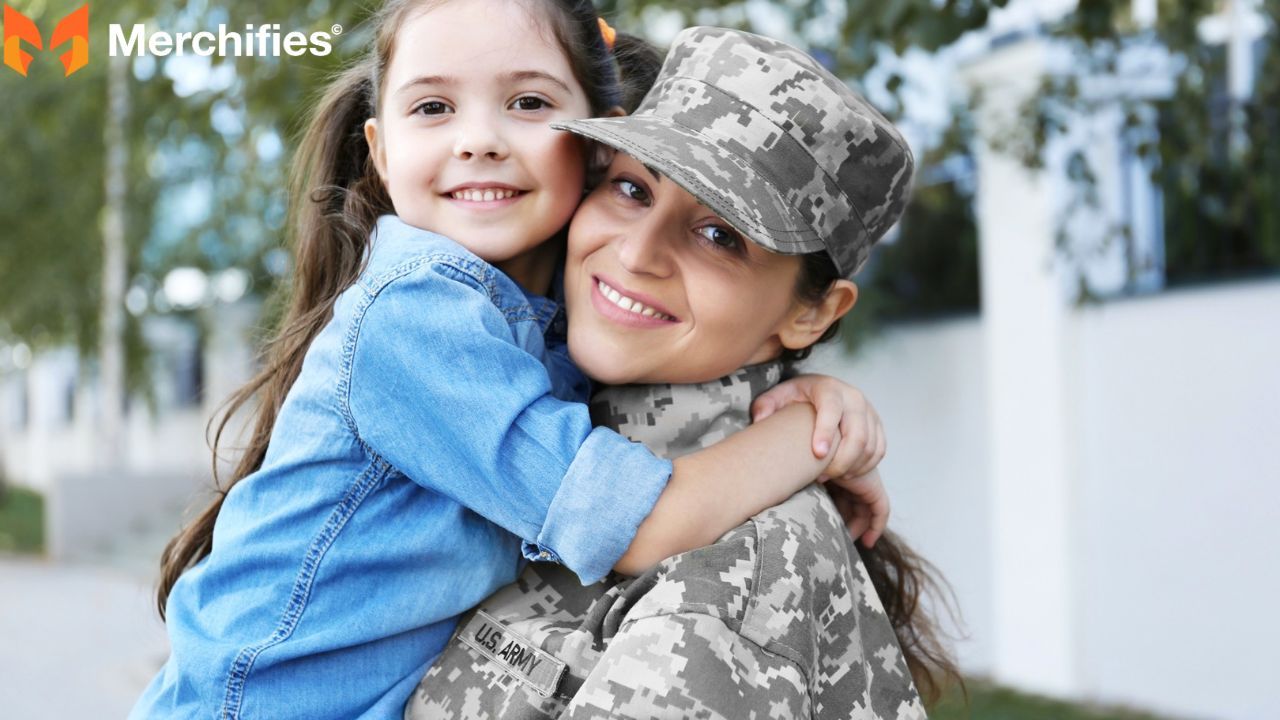
They take a group photo. The same pose. The same location. Year after year.
"We have 15 years of photos now," explains daughter Emma Patterson. "You can see kids grow up. See new babies join. See people pass away and new spouses arrive. The uniforms stay the same. The family changes. It's like watching time move through military service."
They post the photo on social media with #WearTheirService. Hundreds of other families have joined the tradition.
First-Day-of-School Blessing
Angela Martinez kisses her daughter's forehead every first day of school, then wraps her in her grandfather's Army field jacket for exactly one minute.
"It's our blessing. Grandpa served so she could get education. We honor that. One minute in his jacket, then she goes to learn."
Her daughter is now 16. She's worn the jacket on the first day of school for 11 years. Next year, she'll wear it to her first day at West Point.
"The jacket is going back to the Army," Angela says with tears in her eyes. "It's coming full circle."
Wedding Day "Something Borrowed"
Nine couples in the Morrison family have borrowed Colonel Morrison's Air Force shirt for wedding photos.
Twenty-three couples in the Chen family have worn pieces of Sergeant Chen's Korean War uniform during their ceremonies.
Military families understand: marriage is its own kind of service. Commitment. Sacrifice. Standing by someone even when it's hard.
Veteran clothing at weddings says, "We come from people who kept their promises. We will keep ours."
New Parent Photo Tradition
When James Rodriguez's daughter was born, he wrapped her in his father's Marine Corps utility shirt for her first photo.
"Dad never met her. He died two years before she was born. But I wanted them connected. This shirt touched both of them. It's the only thing that ever will."
Now, when Rodriguez family babies are born, they're photographed in the Marine shirt within 24 hours. It's blessing. It's baptism. It's welcome to the family.
The shirt has touched 14 grandchildren now. Each one connected to a man they'll never meet, through fabric that remembers him.
Frequently Asked Questions About Wearing Veteran Parents' Shirts
Is it legal to wear my deceased father's military uniform?
Yes, it's legal for immediate family members to wear deceased veteran's uniforms as remembrance, as long as you're not impersonating military personnel or wearing it to fraudulently obtain benefits.
The Stolen Valor Act of 2013 specifically prohibits wearing military medals or decorations you didn't earn with intent to obtain money, property, or tangible benefits. Wearing your father's shirt to honor his memory doesn't violate this law.
However, wearing a complete uniform to a military installation, claiming active duty status, or using it to receive veterans' discounts would be illegal.
Can I wear my dad's military shirt if I never served?
Absolutely. Wearing a veteran parent's shirt is a way to honor their service and maintain family connection. Most veterans appreciate when their children proudly wear their military clothing as tribute.
Just be clear when people ask: "This was my father's. He served in [branch, years]. I wear it to honor him."
Never claim the service as your own. Never say "I served" or "When I was in the military" while wearing your parent's shirt.
Will veterans be offended if I wear my parent's uniform?
Most veterans aren't offended when children wear deceased parents' military clothing—they're touched.
I've worn my father's Vietnam jacket to VFW posts, VA hospitals, and military museums. Every time, veterans approach me with respect. They ask about him. They share their own stories. They thank me for remembering.
The few negative reactions I've received came from civilians who didn't understand, not from veterans.
One Marine veteran told me: "Your dad's shirt should be worn. He didn't serve so it could rot in a closet. He served so his kid could be free. You wearing that shirt? That's proof his service mattered. That's what we all hope for—to be remembered."
How do I know if my parent's military shirt is valuable or rare?
Age and condition determine value. Generally:
High value (potentially $500-$5,000+):
Pre-Vietnam War uniforms in good condition
WWII or Korean War items with original patches
Named uniforms with verified combat history
Uniforms from elite units (Rangers, Special Forces, Airborne)
Items with documented provenance
Moderate value ($100-$500):
Vietnam-era uniforms with original insignia
Cold War items from specific units
Desert Storm uniforms in excellent condition
Sentimental value primarily:
Modern uniforms (post-2000)
- Items missing insignia or name tapes
- Heavily worn or damaged pieces
- Mass-produced items
But here's the thing: monetary value doesn't matter if the shirt connects you to your parent.
My father's field jacket is worth maybe $75 to a collector. It's priceless to me.
Should I wear my parent's military shirt to their funeral?
This is deeply personal and depends on your family's culture and your parent's wishes.
Reasons to wear it:
- Physical closeness during goodbye
- Visible tribute to their service
- Comfort in familiar sensory connection
Statement that their legacy continues through you
Reasons not to wear it:
- Other family members might find it painful
- You might not be emotionally able to handle the intensity
- Funeral home or cemetery might have dress code restrictions
- You might want to preserve the shirt in pristine condition
Consider this compromise: wear the shirt during the private family viewing, then change into formal clothes for the public service.
Or do what Marcus Greene did: He wore his mother's Navy uniform shirt under his suit jacket at her funeral. "Nobody saw it. I didn't need them to. It was for me and Mom. Our private goodbye."
Can I alter my parent's military uniform to fit me better?
I don't recommend permanent alterations to military uniforms.
These items are historical artifacts. Your parent wore them. Cutting, resizing, or modifying them destroys that direct physical connection.
Instead, try:
Wearing it loosely (that's how military uniforms often fit anyway)
Layering it over fitted clothing
Rolling sleeves or leaving it unbuttoned
Using safety pins for temporary adjustments
Having a replica made in your size (keep original intact)
If the uniform is falling apart and unwearable, consider shadow box display instead of alteration.
Sarah Mitchell explains: "Dad's Army shirt is three sizes too big. I swim in it. But that's part of the experience—feeling how much bigger than me he was. How much space his body took up. How much presence he had. Making it fit me perfectly would erase that."
What if I have siblings who also want the military shirt?
Share it. Rotate custody. Create a system.
The shirt belongs to all of you equally. Your parent loved all their children, not just one.
Document the rotation agreement in writing:
Who keeps it when (6 months each? 1 year each?)
Where handoff occurs
Who pays for preservation/cleaning
What happens if someone moves far away
Who gets it if one sibling dies
Can it be worn during custody or only stored?
Some families create group text threads with photos whenever someone wears the shirt. "Dad's visiting me this month—took him to the beach!" That way, everyone shares in the experience even when they don't physically have the uniform.
How do I explain to my own children why I wear their grandparent's military shirt?
Tell them the truth in age-appropriate language.
For young children (ages 3-7): "This shirt was Grandpa's when he was a soldier. When I wear it, I feel close to him. It's like getting a hug from Grandpa, even though he's in heaven now."
For older children (ages 8-12): "Grandpa served in the military before you were born. This shirt represents his bravery and sacrifice. When I wear it, I'm honoring his service and teaching you about your family history."
For teenagers: "This isn't just a shirt—it's a physical connection to Grandpa's service. He wore this during [specific war/deployment]. When I wear it, I'm keeping his memory alive and reminding myself of the values he taught me: duty, honor, sacrifice. Someday, you might want to wear it too."
Let them touch it. Smell it. Try it on if they want.
David Morrison's 10-year-old daughter wears her grandfather's Air Force shirt over her pajamas sometimes. "It's our family superhero cape," Morrison says. "She's not wrong."
Is there a proper way to dispose of a veteran's uniform that's too damaged to keep?
Never throw military uniforms in regular trash.
If your parent's shirt is beyond preservation:
Option 1: Flag retirement ceremony Many VFW posts hold ceremonies where they retire tattered American flags. They'll often include damaged military uniforms in the same respectful ceremony. The items are burned with honor and ceremony.
Option 2: Military museum donation Even damaged uniforms have historical value. Museums use them for educational displays or textile research. Contact local military museums, state historical societies, or the National WWII Museum.
Option 3: Textile repurposing Some organizations create quilts, teddy bears, or pillows from damaged military uniforms. You preserve pieces while making them functional.
Option 4: Shadow box preservation Even if most of the shirt is damaged, you can often preserve a section with the name tape, rank insignia, or unit patch in a shadow box display.
Option 5: Burial with veteran Some families place damaged uniform pieces in the casket during burial. The uniform returns to earth with the person who wore it.
What you should never do: casually toss it in the trash. These items deserve respectful disposition, just like your parent did.
The Shirt I Still Can't Wear
Let me be honest about something.
My father's dress uniform shirt still hangs in my closet. I've owned it for seven years. I've worn it exactly zero times.
Not because I don't want to. Because I can't.
Not yet.
Every time I reach for it, I remember the last time I saw him wear it. The funeral. Not his funeral—his best friend's. Dad stood at attention in that shirt, tears running down his face, while "Taps" played.
Six months later, Dad died. Same uniform shirt. Same cemetery.
I can't separate the shirt from those images. I can't wear it without seeing death.
Maybe someday. Maybe when enough time passes. Maybe when my own son is old enough to ask about Grandpa, I'll pull it out and tell the stories the shirt holds.
Or maybe I'll never wear it. Maybe that's okay too.
There's no rule that says you have to wear your parent's military shirt. No requirement that you be strong enough, ready enough, healed enough.
Sometimes the shirt serves its purpose just by existing. By being there in your closet. By smelling faintly like them when you open the garment bag.
Sometimes remembering is enough.
Final Thoughts: Wearing Their War, Honoring Their Peace
These shirts are bridges.
They connect past to present. Child to parent. Sacrifice to freedom. Memory to reality.
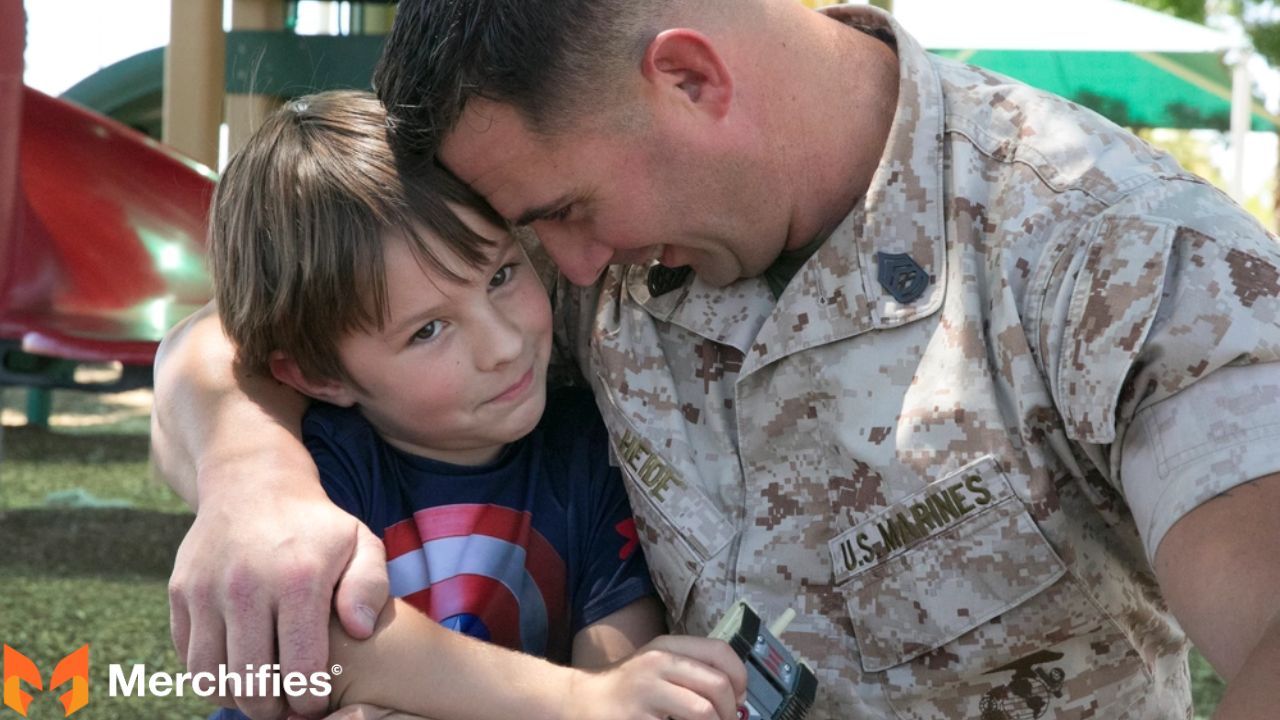
When you wear your father's war, you're not glorifying violence. You're not celebrating death. You're acknowledging that your freedom was purchased with his youth. Your peace was built on his sacrifice.
Every veteran shirt tells two stories: the story of service and the story of love.
The service story is about duty, honor, courage, deployment, combat, survival.
The love story is about why they served. To protect their future family. To give their children a safer world. To ensure their grandchildren would never face the same fights.
You, wearing that shirt, are proof that their love mattered.
You are the reason they served.
And when you wear their uniform, you tell them—across time, across death, across whatever separates us—that you remember. That you understand. That their service wasn't for nothing.
That's what these real stories behind veteran shirts ultimately reveal: every inherited military shirt is a love letter written in fabric, delivered across generations.
Your father wore that shirt in war so you could wear it in peace.
That's worth honoring.
That's worth remembering.
That's worth passing to your own children, who will pass it to theirs, until the shirt becomes mythology, and mythology becomes family truth:
We come from people who served. We come from people who sacrificed. We come from people who loved us before we existed.
And we wear their shirts to prove we remember.
-d4c38c342cdf20ca.jpeg)


-b555fcc6b204c456.jpeg)




